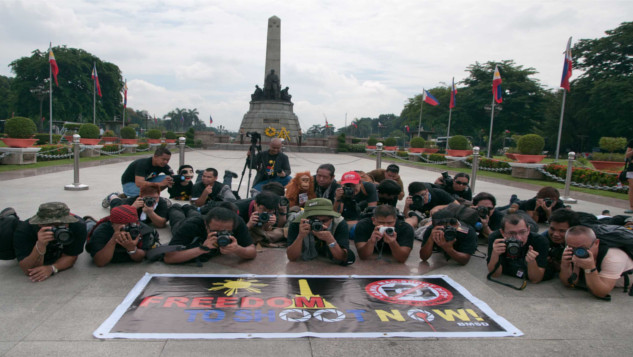SUMMARY
This is AI generated summarization, which may have errors. For context, always refer to the full article.

MANILA, Philippines – On Independence Day, a group of photographers trooped to Manila’s historic landmark, the Rizal Park, asserting their freedom to take pictures in public places.
Nearly a hundred photographers staged a “planking” protest in front of the Rizal monument to protest alleged discrimination against Filipino photographers.
“We declare our Independence Day as a day where every Filipino can freely take pictures,” said Mel Cortez, founder of the group Bawal Mag Shoot Dito – Only in the Philippines.
“This is in response to the continuing abuse to camera-wielding Filipinos who are discriminated and barred from fully expressing their photography in historic and public sites in our country especially Rizal Park and Intramuros,” he said.
From Rizal Park, the group that has more than 10,000 members on its Facebook page marched to the walled city of Intramuros.
They also condemned security personnel in Intramuros and Rizal Park where Digital SLR camera users are reportedly profiled and selectively prevented from taking photos unless they are able to secure a permit and pat the administrator.
“Unlike foreign nationals who are free to shoot around the historic sites, professional photographers, hobbyists and even Filipino tourists with cameras are discriminately targeted with the ‘no-pay-no-shoot policy’ reserved to commercial photo shoots,” said Cortez.
According to him, the park administration charges P2,000 for a 4-hour pre-nuptial pictorial while National Parks and Development Committee collects P1,000.
“They are looking at us as their milking cows. In the first place, there is no official policy on not allowing photographers in taking pictures in historic sites,” he said.
“But the unclear policy of charging photographers presents ambiguity that creates loopholes and makes all camera-wielding Filipinos susceptible to abuse,” explained Cortez.– Rappler.com
Related Stories:
Add a comment
How does this make you feel?
There are no comments yet. Add your comment to start the conversation.